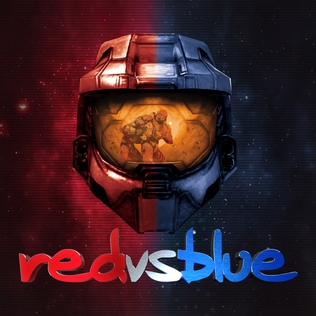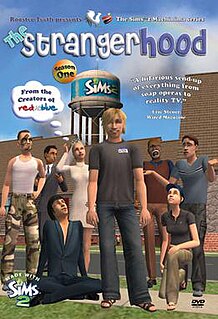
Machinima, originally machinema is the use of real-time computer graphics engines to create a cinematic production. Most often, video games are used to generate the computer animation. The word "machinima" is a portmanteau of the words machine and cinema.

Anachronox is a 2001 role-playing video game produced by Tom Hall and the Dallas Ion Storm games studio. The game is centered on Sylvester "Sly Boots" Bucelli, a down-and-out private investigator who looks for work in the slums of Anachronox, a once-abandoned planet near the galaxy's jumpgate hub. He travels to other planets, amasses an unlikely group of friends, and unravels a mystery that threatens the fate of the universe. The game's science fiction story was influenced by cyberpunk, film noir, and unconventional humor. The story features a theme of working through the troubles of one's past.

LithTech is a game engine developed by Monolith Productions and comparable with the Quake and Unreal engines. Monolith and a number of other video game developers have used LithTech as the basis for their first-person shooter games.

Red vs. Blue, often abbreviated as RvB, is an American web series created by Burnie Burns with his production company Rooster Teeth. The show is based on the setting of the military science fiction first-person shooter series and media franchise Halo. It is distributed through Rooster Teeth's website, as well as on DVD, Blu-ray, and formerly on the El Rey Network and Netflix. The series initially centers on two opposite teams fighting in an ostensible civil war—shown to actually be a live fire exercise for elite soldiers—in the middle of Blood Gulch, a desolate box canyon, in a parody of first-person shooter video games, military life, and science fiction films. Initially intended to be a short series of six to eight episodes, the project quickly and unexpectedly achieved significant popularity following its premiere on April 1, 2003. The series consists of eighteen seasons and five mini-series. Red vs. Blue is the third longest-running animated webseries of all time, behind Homestar Runner and Neurotically Yours.
Katherine Anna Kang is an American video game designer.

The Strangerhood is a comedy series created by Rooster Teeth Productions. The series is produced primarily by using the machinima technique of synchronizing video footage from video game to pre-recorded dialogue and other audio. The animation is created using the video game The Sims 2 as a parody of sitcoms and reality television. The series details the lives of eight "assorted stereotypes" who wake up living in a neighborhood called Strangerhood Lane, with no memory of who they are, where they are, or how they got there.

Jodelle Micah Ferland is a Canadian actress. She debuted as a child actress at the age of four in the television film Mermaid (2000) for which she won a Young Artist Award and received a Daytime Emmy Award nomination, making her the youngest nominee in Emmy history. Her career progressed with roles in the television film Carrie (2002), the horror films They (2002), Tideland (2005), Silent Hill (2006) and Case 39 (2009), and the comedy film Good Luck Chuck (2007). She also led the television series Kingdom Hospital (2004).

Diary of a Camper is an American short film released in October 1996 that was made using id Software's first-person shooter video game Quake. The film was created by the Rangers, a clan or group of video game players, and first released over the Internet as a non-interactive game demo file. The minute and a half-long video is commonly considered the first example of machinima—the art of using real-time, virtual 3D environments, often game engines, to create animated films. The story centers on five members of the Rangers clan fighting against a lone camper in a multiplayer deathmatch.

BloodSpell is a 2006 fantasy film produced by Strange Company. BloodSpell employs filming techniques known as machinima, and is the first feature-length production to use BioWare's Aurora Engine, developed for the role-playing video game Neverwinter Nights, to generate the video portion of the film. The film was serially released in short episodes under the Creative Commons Attribution-NonCommercial-ShareAlike 2.5 License, which allows for redistribution, modification, and creation of fan fiction. Strange Company have asserted somewhat controversially that, as of 2006, BloodSpell, was the largest machinima production. The series features numerous cameo appearances, including several voice appearances from science fiction author Charles Stross.
The following is a list of notable machinima-related events in the year 2006. These include several new machinima productions, season finales, and the 2006 Machinima Festival.

Operation Bayshield is a short 1997 film made by Clan Undead, a group of video game players. The work was created by using the machinima technique of recording a demonstration file of player actions in id Software's 1996 first-person shooter video game Quake, which could replay such files on demand. The group had seen the first known machinima productions, made by United Ranger Films, and decided to make a comedy film. The result, Operation Bayshield, follows a task force's attempts to thwart terrorists who have chemical explosives. Released on January 23, 1997, the work received praise from contemporary Quake movie review sites and helped to attract others, including Hugh Hancock of Strange Company and members of the ILL Clan, to machinima. It pioneered technical advances in machinima, such as the use of custom digital assets and of lip synchronization.
The following is a list of notable machinima-related events in the year 1996. These include the release of id Software's first-person shooter computer game Quake. This game was used to create the first machinima works later that year.

The Seal of Nehahra is an American film made in 2000, created by Mindcrime Productions as part of the Nehahra Project. Made using a modified version of id Software's 1996 first-person shooter computer game Quake and released over the Internet as a non-interactive game demo package, the film was the longest released Quake movie — as Quake-based machinima was known at the time. At a total length of three hours and fifty five minutes, it is the longest single-piece machinima production as of 2017. The film received high reviews from the major Quake movie review sites of the time, Psyk's Popcorn Jungle and The Cineplex.

Machinima, Inc. was an American multiplatform online entertainment network owned by WarnerMedia. The company was founded in January 2000 by Hugh Hancock and was headquartered in Los Angeles, California.
"Make Love, Not Warcraft" is the eighth episode in the tenth season of the American animated television series South Park. The 147th episode overall, it first aired on Comedy Central in the United States on October 4, 2006. In the episode, named in a play on words after the 1960s counterculture slogan "Make love, not war", Cartman, Kyle, Stan, and Kenny enjoy playing the popular massively multiplayer online role-playing game World of Warcraft. When a high-level player goes around killing other players in the game, they start playing the game every day to try to stop him. The episode was written and directed by series co-creator Trey Parker. In 2015, he and co-creator Matt Stone listed it as their third-favorite episode of the series.

Dance, Voldo, Dance is a machinima-based music video produced in 2002 by Chris Brandt. The video, created using the fighting game Soulcalibur, features two players both controlling the character Voldo, using existing in-game animation to have the characters perform a synchronized dance to the song "Hot in Herre" by musician Nelly. The result of over a week's full-time preparation and training, the video was conceived after Brandt noticed the character's animations and attacks could be triggered in sync with the beat of a song, and the reactions of onlookers to such a display. While several groups demonstrated interest in showcasing the video, complications arose from the copyright holders whose works were involved in creation.

Twilight is a 2008 American romantic fantasy film directed by Catherine Hardwicke from a screenplay by Melissa Rosenberg, based on the 2005 novel of the same name by Stephenie Meyer. It is the first instalment in The Twilight Saga film series. The film stars Kristen Stewart and Robert Pattinson as Bella Swan, a teenage girl, and Edward Cullen, a vampire, respectively, and focuses on the development of Bella and Edward's relationship and the subsequent efforts of Edward and his family to keep Bella safe from a coven of evil vampires.

Male Restroom Etiquette is a 2006 American short subject created by Phil R. Rice and produced by his company Zarathustra Studios. The film is a mockumentary about unwritten rules of behavior in male restrooms and is intended to be a parody of educational and social guidance films. Narrated by Rice, Male Restroom Etiquette states restroom customs to be followed and depicts a scenario of social chaos if they are violated. The film was made using the machinima technique of recording video footage from computer games, namely The Sims 2 and SimCity 4. Male Restroom Etiquette won multiple awards and was listed by Guinness World Records Gamer's Edition in 2009 as the most popular Sims video uploaded to YouTube.
Based on Id Software's open stance towards game modifications, their Quake series became a popular subject for player mods beginning with Quake in 1996. Spurred by user-created hacked content on their previous games and the company's desire to encourage the hacker ethic, Id included dedicated modification tools into Quake, including the QuakeC programming language and a level editor. As a game that popularized online first-person shooter multiplayer, early games were team- and strategy-based and led to prominent mods like Team Fortress, whose developers were later hired by Valve to create a dedicated version for the company. Id's openness and modding tools led to a "Quake movie" community, which altered gameplay data to add camera angles in post-production, a practice that became known as machinima.













